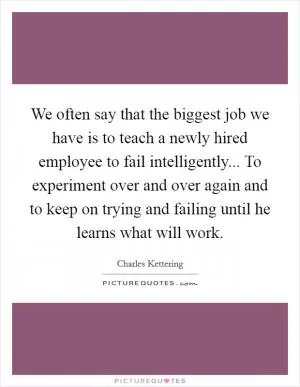Problems are the price of progress. Don't bring me anything but trouble. Good news weakens me

Problems are the price of progress. Don't bring me anything but trouble. Good news weakens me
Charles Kettering, an American inventor, engineer, and businessman, is often credited with the quote, "Problems are the price of progress. Don't bring me anything but trouble. Good news weakens me." This statement encapsulates Kettering's belief that challenges and obstacles are necessary for growth and innovation. Throughout his career, Kettering faced numerous setbacks and difficulties, but he viewed them as opportunities to learn and improve.Kettering was a pioneer in the field of automotive engineering, most notably for his work at General Motors where he developed the electric starter for automobiles. This invention revolutionized the automotive industry and made it easier for people to start their cars. However, Kettering did not achieve this success without facing numerous challenges along the way. He encountered technical problems, financial constraints, and resistance from within the company. Despite these obstacles, Kettering persevered and ultimately succeeded in creating a groundbreaking innovation.
Kettering's philosophy that "problems are the price of progress" reflects his belief that setbacks and difficulties are an inherent part of the creative process. He understood that in order to achieve meaningful progress, one must be willing to confront and overcome challenges. Kettering embraced adversity as an opportunity for growth and development, rather than as a hindrance to success.
Furthermore, Kettering's aversion to good news can be interpreted as a desire to constantly push himself and his team to strive for excellence. He believed that complacency and comfort could lead to stagnation and mediocrity. By seeking out challenges and difficulties, Kettering was able to continuously improve and innovate.












 Friendship Quotes
Friendship Quotes Love Quotes
Love Quotes Life Quotes
Life Quotes Funny Quotes
Funny Quotes Motivational Quotes
Motivational Quotes Inspirational Quotes
Inspirational Quotes